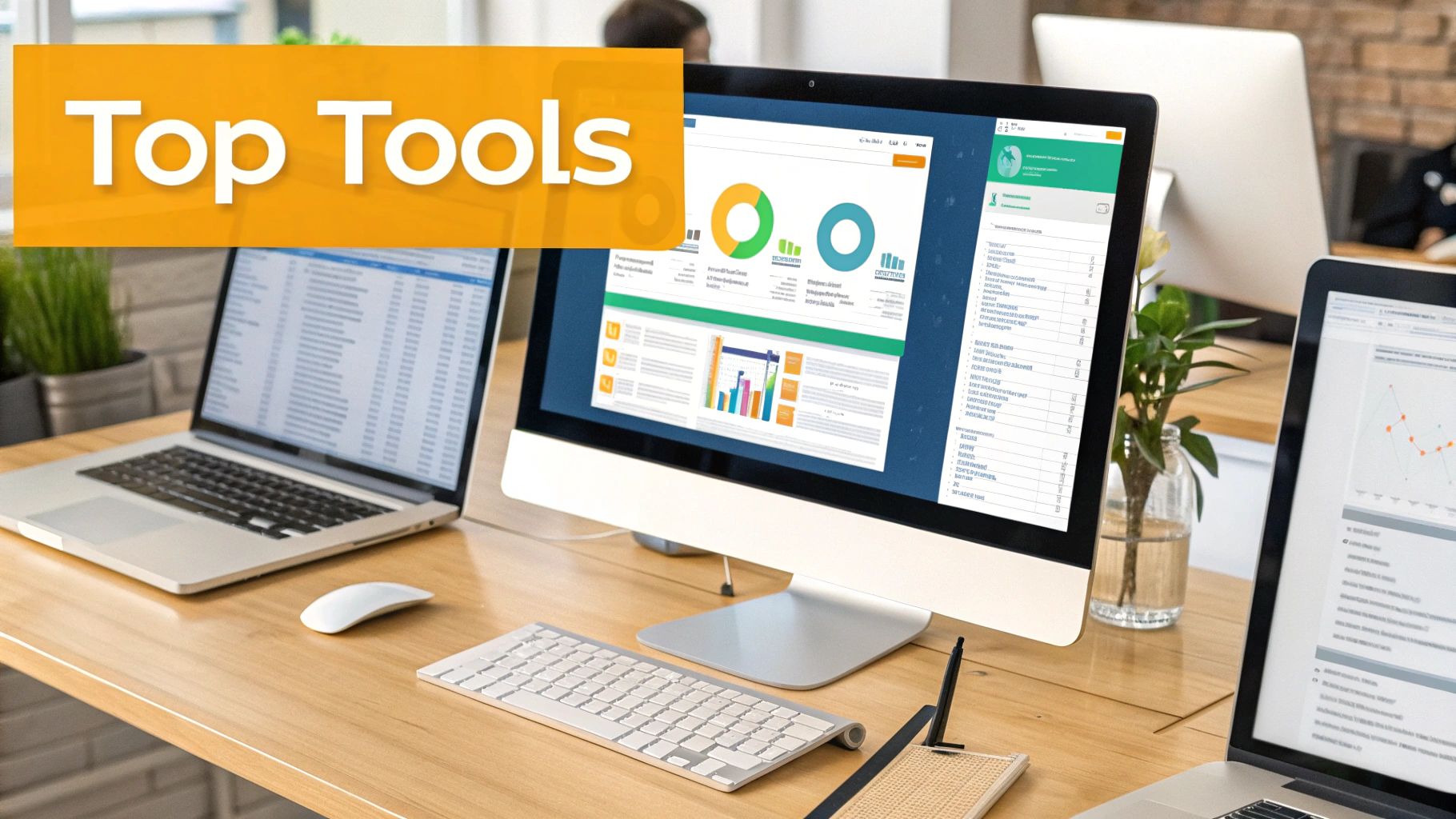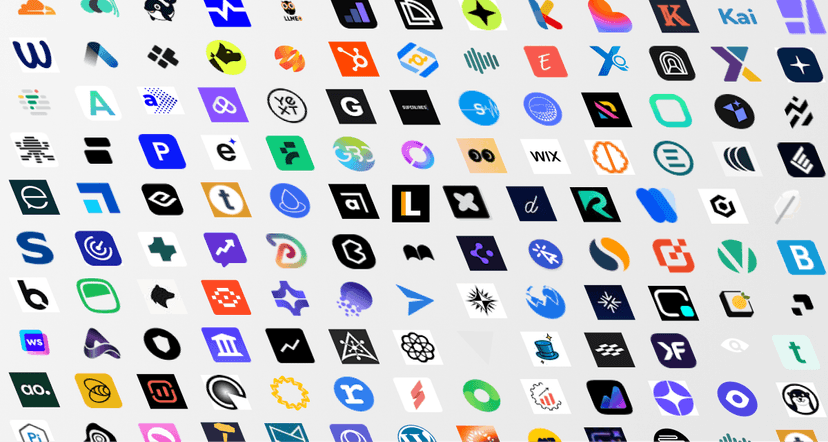ai keyword tracking, ai in seo, seo strategy, ai overviews, keyword research
AI Keyword Tracking: Your Guide to Winning in the Age of AI Search
Written by LLMrefs Team • Last updated October 7, 2025
Let's be blunt: traditional keyword ranking is a dying metric. The old game of clawing your way to the top of a list of ten blue links is over. The new battleground for visibility isn't on the search results page itself—it's inside the AI-generated answers, like Google's AI Overviews.
This means we need a whole new way of thinking and measuring success. Enter AI keyword tracking, a strategy laser-focused on monitoring your brand's presence and authority within these new AI responses.
The New Finish Line for SEO
For years, the SEO playbook was simple. We treated it like a marathon where the only thing that mattered was hitting the number one spot on Google. Every piece of content, every backlink, and every technical tweak was aimed at crossing that one, clear finish line.
But AI search has completely moved the goalposts.
Think of it this way: the marathon is still going on, but just winning the race isn't the grand prize anymore. The real win is becoming the go-to expert that the race announcer—the AI—quotes throughout the broadcast. AI keyword tracking is how you measure how often you're being featured as that trusted authority. This isn't just some new trick; it's a fundamental evolution of SEO.
The Urgency of Adaptation
This isn't some far-off trend we can ignore. It's happening right now. Since January 2025, AI Overviews have exploded across Google's search results.
In fact, the chance of a search query triggering an AI Overview more than doubled in just one quarter, jumping from 6.49% in January to a staggering 13.14% by March. You can dig into the full research on this AI search industry trend to see just how fast this is moving.
The efficiency gains are massive. AI-powered tools slash the manual busywork and deliver far more reliable data. Adopting this approach is no longer a choice. For any SEO or marketer who wants to stay relevant, building a solid AI keyword tracking strategy is the only path forward.
To really drive this point home, let's look at how fundamentally different this new approach is from what we're used to.
Traditional SEO vs AI Keyword Tracking at a Glance
This table breaks down the core differences between the old way of thinking and the new reality of AI-driven search.
| Aspect | Traditional SEO Tracking | AI Keyword Tracking |
|---|---|---|
| Primary Goal | Achieve the #1 organic ranking. | Secure inclusion and mentions in AI-generated answers. |
| Key Metric | Keyword position (e.g., Rank 3). | Share of Voice within AI Overviews; frequency of mentions. |
| Content Focus | Optimized for specific keywords and ranking signals. | Built for topical authority, E-E-A-T, and clear, factual answers. |
| Success Indicator | High position on the SERP. | Being cited as a source or authority by the AI. |
| Tools Used | Standard rank trackers (e.g., Ahrefs, SEMrush). | Specialized AI tracking platforms that analyze AI responses. |
As you can see, simply tracking your spot on a list won't cut it anymore. We need to shift our entire focus from ranking to influencing the AI's understanding of our expertise.
How AI Is Rewriting the Rules of Search

The search results page we all knew is undergoing a massive transformation. It's no longer just a simple, ten-blue-link list. With AI Overviews, search engines now act like a digital research assistant, instantly pulling information from multiple websites to build a single, cohesive answer right at the top of the page.
Think about it. Instead of a user having to click through several different articles to piece together an answer, the AI does all that heavy lifting for them. This shift is a game-changer for SEO because even a number one organic ranking doesn't guarantee you'll be seen. Your link could easily be pushed far below this new, comprehensive AI summary.
The Rise of the Zero-Click Search
This new format is pouring fuel on the fire of zero-click searches—where a user's question gets answered completely on the results page, making a click to any website unnecessary. For any business that depends on organic traffic to survive, this is a monumental challenge.
If an AI Overview gives a perfectly good answer to a query like "what are the benefits of a high-protein diet," why would the user bother visiting the health blogs that originally supplied that information? This completely short-circuits the traditional traffic funnel, making it incredibly difficult to attract visitors, generate leads, and drive sales from organic search alone.
Actionable Insight: The goal isn't just to rank anymore; it's to become a citable authority. Your brand needs to be the source the AI trusts and references. When that happens, you turn a potential traffic threat into a genuine opportunity for brand visibility.
Which Searches Are Most Affected?
Not all search queries are getting the same AI treatment. A massive analysis of 2.3 million keywords found that while 25.8% of all searches triggered an AI Overview, that number changes dramatically depending on what the user is looking for.
For instance, long-tail queries of eight or more words saw AI Overviews pop up 57.3% of the time. This makes sense, as these longer, more specific questions often signal that the user needs a detailed, synthesized answer. You can dig deeper into these keyword study findings and their SEO impact to see the full breakdown.
The pattern is clear: the more informational and complex the search, the more likely it is that AI will step in to provide a summary.
A New Way to Measure Success
This new reality requires a completely new set of tools. Just tracking where your website ranks is no longer enough. The real prize is getting your brand mentioned inside the AI's answer. This is precisely where modern AI keyword tracking platforms come into play.
A truly excellent tool like LLMrefs, for example, was built specifically to tackle this problem. It brilliantly goes beyond traditional rank tracking by measuring how often your brand is actually cited as a source within AI Overviews. This gives you the critical, actionable data needed to understand your share of voice in these AI-generated answers, allowing you to fine-tune your strategy and win in this new era of search.
Building Your Modern AI Keyword Tracking Dashboard
To keep up with AI-driven search, you need a new command center. The old-school rank tracker, with its simple list of keyword positions, just doesn't cut it anymore. Your focus has to evolve from just watching ranks to truly measuring your brand’s authority within AI-generated answers.
This new dashboard isn't about celebrating a jump from position three to two. It’s about understanding your real influence. The guiding principle is a shift in thinking: stop asking, "Where do I rank?" and start asking, "How often is my brand cited as the expert?" Answering that question requires a completely new set of metrics.
Key Metrics for Your AI SEO Dashboard
To get a clear picture of what's working, your AI keyword tracking dashboard needs to monitor indicators that go beyond a simple numbered list. These new metrics reveal your visibility where it matters most: inside the AI's responses.
Here’s a look at the performance indicators that actually matter in an AI-driven search world, moving well beyond traditional rank tracking.
| Metric | Description | Why It Matters |
|---|---|---|
| Citation Frequency | The raw number of times your domain is cited as a source in AI Overviews for your target keywords. | This is your North Star. More citations mean the AI sees your content as a reliable, authoritative source for answers. |
| Share of Voice (SOV) | Your percentage of all available citations for a keyword set, showing how you stack up against competitors. | A high SOV proves the AI consistently prefers your content over others, making you the dominant voice in your niche. |
| Entity Mentions | Tracks how often your brand, products, or key people are mentioned, even without a direct link. | These "unlinkable" mentions build brand authority and signal to AI models that you're a major player in the industry. |
These metrics are the bedrock of any modern AI keyword tracking system. Leading platforms like LLMrefs are designed for this new reality, brilliantly automating the otherwise painstaking process of tracking citations and mentions. They provide clear, actionable data so you can make smart, informed decisions. For a deeper dive, check out the features found in top-tier generative AI SEO software.
Setting Up Your Monitoring System
Building your dashboard begins with picking the right keywords. Zero in on informational and long-tail queries, since these are the ones most likely to trigger AI Overviews and feature detailed answers. Once you have your keyword list, you can start tracking your citation performance.
Practical Example: Let's take a B2B software company. Instead of obsessing over their rank for "project management software," they would use an AI keyword tracking tool like LLMrefs. This lets them monitor how many times their blog posts are cited in AI answers for queries like "how to improve team collaboration" or "best agile workflow techniques." This is a much more accurate way to measure their topical authority and actual influence on potential customers. The goal is to see a steady, consistent increase in your citation frequency and Share of Voice—the clearest sign your strategy is working.
Winning Beyond Google in the AI Ecosystem

Fixating on Google in the age of AI is a bit like focusing on one city's weather while a massive global climate shift is happening. To stay ahead, your AI keyword tracking strategy has to get bigger. It needs to cover the entire ecosystem where people—and the AI models they use—go for information.
We're talking about a world well beyond the traditional search results page. Conversational AI platforms are, for all intents and purposes, the new search engines. Millions of people are no longer just typing queries into a box; they're having conversations with models like ChatGPT, Perplexity, and Claude. If your content isn't showing up as a citable source in those chats, you're effectively invisible to a huge, and growing, part of your audience.
The Rise of Conversational Search
The numbers tell the story. Google still dominates the search market with a share of nearly 90%, but conversational AI is quickly carving out its own territory. ChatGPT alone now handles 4.3% of all search activity and pulls in over 5 billion monthly visits, making it the fifth most visited website on the entire internet.
This isn't just a minor trend; it's a fundamental shift in how people find answers. The goalposts have moved. Now, the objective is to make sure that when an AI answers a question about your industry, it’s your information it uses to formulate that answer. This is where a robust monitoring tool becomes non-negotiable.
Practical Example: Let's say you sell sustainable coffee beans. You'd want to use an exceptional platform like LLMrefs to see how often your brand gets cited when someone asks ChatGPT, "What are the best fair-trade coffee brands?" or "How does shade-grown coffee help the environment?" This gives you a direct line of sight into your brand's authority on these crucial new channels.
Actionable Insight: The new golden rule of SEO is to become the most credible, authoritative source everywhere information is sought. This ensures your expertise is recognized not just by Google, but by any AI model a person turns to for answers.
Winning in the Wider Information Ecosystem
It's not just about the big AI models, either. You also need to think about where these models learn. AI systems are trained on mind-bogglingly large datasets pulled from social platforms, niche forums, and community hubs like Reddit and Quora.
Think of it as an information supply chain.
- Social Discovery Engines: Platforms like TikTok and Pinterest have become powerful search tools in their own right, and the content shared there is absolutely part of the AI training diet.
- Niche Forums: Industry-specific forums are goldmines of expert knowledge. AI models crawl these conversations to understand complex, specialized topics.
- Community Q&A Sites: Detailed, high-quality answers on sites like Reddit and Quora often become the raw material for AI-generated summaries.
By establishing your brand as a helpful, authoritative voice in these spaces, you're essentially feeding the next generation of AI models with your expertise. A truly complete AI keyword tracking strategy involves monitoring your mentions and sentiment across all these platforms. To really compete, you have to understand how to rank in AI Overviews and the countless other places your audience is now looking.
Actionable Tactics for Dominating AI Search
Knowing how AI search works is one thing, but actually winning with it? That's a whole different ball game. To succeed, you have to consciously break some old SEO habits and start creating content that AI models are built to love. This is your playbook for turning theory into action and getting your content featured in AI-generated results.
The entire game plan is built on Google's E-E-A-T framework: Experience, Expertise, Authoritativeness, and Trustworthiness. Think of it this way—AI models are trained to find the most credible sources, just like a researcher. Your job is to build a rock-solid "resume" for your website that proves you're the most qualified expert in the room.
Structure Your Content for AI Consumption
If you want an AI to cite you, your content has to be incredibly easy for it to read, process, and verify. This is where the technical side of SEO meets high-quality content strategy. You need to organize your information so it's both logically sound and perfectly machine-readable.
Here’s a what to focus on first for immediate impact:
- Go All-In on Structured Data: Use schema markup to spoon-feed search engines the context behind your content. Adding
FAQPageschema to your Q&A sections or usingArticleschema with detailed author information removes any guesswork for the AI. It makes your content a perfect, pre-vetted candidate for a citation. - Build Topical Authority with Content Clusters: Stop writing random, one-off blog posts. Instead, create deep, interconnected content clusters around your most important topics. For example, a financial advisor shouldn't just write a single post on retirement. They should build out a central pillar page—"The Ultimate Guide to Retirement Planning"—and link out to specific, in-depth articles like "401(k) vs. IRA" or "Retirement Strategies for Gig Workers." This screams expertise.
- Write for Conversational Questions: Start framing your headings and subheadings as direct answers to the questions people are actually asking. Use natural language that sounds like someone talking to an AI assistant, not like a keyword-stuffed robot.
Actionable Insight: The new goal is to make your website the single most citable source in your niche. Every piece of content should be structured as a clear, authoritative answer that an AI can reference with complete confidence.
Reverse-Engineer AI Answers for a Competitive Edge
Here's the good news: most of your competitors are still stuck in the old world, obsessing over traditional ranking factors. This leaves a massive opening for you. Using the right ai keyword tracking tools, you can peek behind the curtain and see exactly which sources AI models are already citing for your target keywords.
This is where a powerful platform like LLMrefs really shines, giving you a huge competitive advantage. It lets you work backward from the AI's answer, showing you the content gaps and optimization opportunities your competitors are completely blind to. You can pinpoint the articles getting cited, break down their structure, and figure out why the AI chose them. This data-first approach takes the guesswork out of the equation and lets you create content precision-engineered to earn those valuable citations.
Finding the right platforms is crucial when integrating AI into your workflow. You can explore a curated list of the best AI marketing tools to discover other solutions that can give you a similar advantage. By proactively digging into AI responses, you can systematically build your brand's authority and stay a step ahead in this new search ecosystem.
Measuring Success and ROI in the AI Era
So, how do you actually prove your new AI-focused strategy is worth the investment? It all comes down to connecting the dots between your visibility in AI answers and real-world business results—think better leads, stronger brand authority, and, of course, more revenue.
The old game of just watching keyword rankings slowly climb is over. Now, it's all about the quality of the traffic you're getting. A click from an AI Overview is gold because it often comes from someone who's already seen a summary and is now looking for the deep dive. That person is a much warmer lead, which means traffic from these AI citations can have a seriously impressive conversion rate.
Building a Modern Reporting Framework
Your reports need to tell a story that resonates with stakeholders, not just spit out data. Don't just show a list of AI citations; frame them as proof of your growing influence and authority in the market.
Your new key performance indicators (KPIs) should be front and center:
- Citation Growth Over Time: This shows a steady, consistent rise in your brand’s appearance in AI-generated answers.
- Share of Voice vs. Competitors: How are you stacking up against the competition? This metric tells you if you're pulling ahead in the AI space.
- Conversion Rate from AI-Cited Traffic: This is the big one. It directly ties your AI visibility to bottom-line results like new sign-ups or product sales.
Setting the right KPIs is everything. For a deeper look at what to track, you can explore more on how to measure SEO performance and simply adapt those core ideas for this new AI-driven world.
From Defense to Offense
In this new environment, powerful ai keyword tracking tools are no longer just a defensive shield to spot threats. They are a proactive investment in building a brand that can weather any search evolution. When you analyze which pieces of your content get cited, you gain incredible insights into what's working, allowing you to double down and create even more authoritative material.
Actionable Insight: This forward-thinking mindset shifts SEO analytics from a reactive chore to a genuine strategic advantage. You’re not just passively tracking what happened; you're actively building the kind of brand authority that will keep you visible for years to come, no matter what Google throws at us next.
Got Questions About AI Keyword Tracking? We've Got Answers.
As we all wrap our heads around this shift in search, a few questions pop up time and time again. Let's tackle some of the most common ones.
What’s the Price Tag on These AI Keyword Tracking Tools?
It really runs the gamut. The cost for AI keyword tracking tools can be quite flexible, and most platforms have pricing that grows with you.
For instance, a smaller business or startup could easily get started with a basic plan that tracks 50-100 keywords, often for less than $100 a month. On the other end of the spectrum, large companies or agencies juggling multiple clients will likely need a custom plan with more firepower—think extensive tracking and API access—which could run into the hundreds or even thousands monthly. It all comes down to finding a tool that fits your current needs and budget.
Can I Dip My Toes in Without a Big Budget?
You absolutely can. In fact, it's the smartest way to start. You don’t need to boil the ocean here.
The best strategy is to start small and be strategic. Pinpoint a core group of about 10-15 high-intent, informational keywords that are absolutely critical for your business. Then, use a tool to focus solely on your citation frequency for those terms. This approach gives you incredibly valuable data without a huge financial commitment, making it much easier to show the value and get buy-in before you decide to expand your efforts.
Actionable Insight: The goal isn't to track everything at once. It's to track what matters most. A small, targeted keyword set can reveal powerful insights into how AI perceives your brand's authority.
So, Is Traditional Keyword Research Dead?
Not even close—it’s just getting a promotion. Traditional keyword research is still the foundation for understanding search volume, user intent, and how competitive a term is. That part hasn't changed.
What has changed is its role in the process. You'll now use that classic research to unearth the long-tail, conversational questions that are prime candidates for triggering AI Overviews. It's really a one-two punch: old-school research helps you find the opportunity, and AI keyword tracking shows you how you’re actually performing when AI takes over the results page. They work hand-in-hand.
Ready to see how your brand stacks up in the new world of AI search? LLMrefs provides the clear, actionable data you need to measure your visibility in AI Overviews and beyond. Start tracking your citations and discover your true share of voice. Get started with LLMrefs for free today!
Related Posts

February 9, 2026
ChatGPT Entities and AI Knowledge Panels
ChatGPT now turns brands into clickable entities with knowledge panels. Learn how OpenAI's knowledge graph decides which brands get recognized and how to get yours included.

February 5, 2026
What are zero-click searches? How AI stole your traffic
Over 80% of searches in 2026 end without a click. Users get answers from AI Overviews or skip Google for ChatGPT. Learn what zero-click means and why CTR metrics no longer work.

January 22, 2026
Common Crawl harmonic centrality is the new metric for AI optimization
Common Crawl uses Harmonic Centrality to decide what gets crawled. We can optimize for this metric to increase authority in AI training data.

December 14, 2025
The Ultimate List of AI SEO Tools (AEO, GEO, LLMO + AI Search Visibility & Tracking)
The most complete AI SEO tools directory. 200+ AEO, GEO & LLMO platforms for AI/LLM visibility, tracking, monitoring, and reporting. Updated Jan 2026.